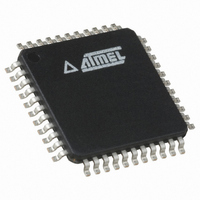ATMEGA164PA-AU Atmel, ATMEGA164PA-AU Datasheet - Page 223

ATMEGA164PA-AU
Manufacturer Part Number
ATMEGA164PA-AU
Description
MCU AVR 16KB FLASH 20MHZ 44TQFP
Manufacturer
Atmel
Series
AVR® ATmegar
Specifications of ATMEGA164PA-AU
Core Processor
AVR
Core Size
8-Bit
Speed
20MHz
Connectivity
I²C, SPI, UART/USART
Peripherals
Brown-out Detect/Reset, POR, PWM, WDT
Number Of I /o
32
Program Memory Size
16KB (8K x 16)
Program Memory Type
FLASH
Eeprom Size
512 x 8
Ram Size
1K x 8
Voltage - Supply (vcc/vdd)
1.8 V ~ 5.5 V
Data Converters
A/D 8x10b
Oscillator Type
Internal
Operating Temperature
-40°C ~ 85°C
Package / Case
44-TQFP, 44-VQFP
Cpu Family
ATmega
Device Core
AVR
Device Core Size
8b
Frequency (max)
20MHz
Interface Type
2-Wire/SPI/USART
Total Internal Ram Size
1KB
# I/os (max)
32
Number Of Timers - General Purpose
3
Operating Supply Voltage (typ)
2.5/3.3/5V
Operating Supply Voltage (max)
5.5V
Operating Supply Voltage (min)
1.8V
On-chip Adc
8-chx10-bit
Instruction Set Architecture
RISC
Operating Temp Range
-40C to 85C
Operating Temperature Classification
Industrial
Mounting
Surface Mount
Pin Count
44
Package Type
TQFP
Package
44TQFP
Family Name
ATmega
Maximum Speed
20 MHz
Operating Supply Voltage
2.5|3.3|5 V
Data Bus Width
8 Bit
Number Of Programmable I/os
32
Number Of Timers
3
Lead Free Status / RoHS Status
Lead free / RoHS Compliant
Available stocks
Company
Part Number
Manufacturer
Quantity
Price
- Current page: 223 of 581
- Download datasheet (27Mb)
8272A–AVR–01/10
Figure 20-13. Data Transfer in Master Receiver Mode
A START condition is sent by writing the following value to TWCR:
TWEN must be written to one to enable the 2-wire Serial Interface, TWSTA must be written to
one to transmit a START condition and TWINT must be set to clear the TWINT Flag. The TWI
will then test the 2-wire Serial Bus and generate a START condition as soon as the bus
becomes free. After a START condition has been transmitted, the TWINT Flag is set by hard-
ware, and the status code in TWSR will be 0x08 (See
MR mode, SLA+R must be transmitted. This is done by writing SLA+R to TWDR. Thereafter the
TWINT bit should be cleared (by writing it to one) to continue the transfer. This is accomplished
by writing the following value to TWCR:
When SLA+R have been transmitted and an acknowledgement bit has been received, TWINT is
set again and a number of status codes in TWSR are possible. Possible status codes in Master
mode are 0x38, 0x40, or 0x48. The appropriate action to be taken for each of these status codes
is detailed in
when the TWINT Flag is set high by hardware. This scheme is repeated until the last byte has
been received. After the last byte has been received, the MR should inform the ST by sending a
NACK after the last received data byte. The transfer is ended by generating a STOP condition or
a repeated START condition. A STOP condition is generated by writing the following value to
TWCR:
A REPEATED START condition is generated by writing the following value to TWCR:
After a repeated START condition (state 0x10) the 2-wire Serial Interface can access the same
Slave again, or a new Slave without transmitting a STOP condition. Repeated START enables
164A/164PA/324A/324PA/644A/644PA/1284/1284P
TWCR
value
TWCR
value
TWCR
value
TWCR
value
SDA
SCL
Table 20-3 on page
TWINT
TWINT
TWINT
TWINT
1
1
1
1
Device 1
RECEIVER
MASTER
TWEA
TWEA
TWEA
TWEA
X
X
X
X
TRANSMITTER
Device 2
SLAVE
TWSTA
TWSTA
TWSTA
TWSTA
224. Received data can be read from the TWDR Register
0
1
0
1
Device 3
TWSTO
TWSTO
TWSTO
TWSTO
0
0
1
0
........
Table 20-2 on page
TWWC
TWWC
TWWC
TWWC
Device n
X
X
X
X
V
CC
TWEN
TWEN
TWEN
TWEN
1
1
1
1
R1
221). In order to enter
R2
–
0
–
0
–
0
–
0
TWIE
TWIE
TWIE
TWIE
X
X
X
X
223
Related parts for ATMEGA164PA-AU
Image
Part Number
Description
Manufacturer
Datasheet
Request
R

Part Number:
Description:
8-bit Microcontroller With 16/32/64k Bytes In-system Programmable Flash - Atmel Corporation
Manufacturer:
ATMEL Corporation
Datasheet:

Part Number:
Description:
8-bit Microcontroller with 16/32/64K Bytes In-System Programmable Flash
Manufacturer:
ATMEL [ATMEL Corporation]
Datasheet:

Part Number:
Description:
Manufacturer:
Atmel Corporation
Datasheet:

Part Number:
Description:
IC AVR MCU 16K 16MHZ 5V 44TQFP
Manufacturer:
Atmel
Datasheet:

Part Number:
Description:
IC AVR MCU 16K 16MHZ 5V 44-QFN
Manufacturer:
Atmel
Datasheet:

Part Number:
Description:
IC AVR MCU 16K 16MHZ 5V 40DIP
Manufacturer:
Atmel
Datasheet:

Part Number:
Description:
MCU AVR 16K FLASH 16MHZ 44-QFN
Manufacturer:
Atmel
Datasheet:

Part Number:
Description:
IC AVR MCU 16K 16MHZ COM 40-DIP
Manufacturer:
Atmel
Datasheet:

Part Number:
Description:
IC AVR MCU 16K 16MHZ COM 44-QFN
Manufacturer:
Atmel
Datasheet:

Part Number:
Description:
IC AVR MCU 16K 16MHZ IND 40-DIP
Manufacturer:
Atmel
Datasheet:

Part Number:
Description:
IC AVR MCU 16K 16MHZ IND 44-QFN
Manufacturer:
Atmel
Datasheet:

Part Number:
Description:
IC AVR MCU 16K 16MHZ IND 44-TQFP
Manufacturer:
Atmel
Datasheet:

Part Number:
Description:
IC MCU 8BIT 16KB FLASH 44TQFP
Manufacturer:
Atmel
Datasheet:

Part Number:
Description:
MCU AVR 16K FLASH 16MHZ 44-TQFP
Manufacturer:
Atmel
Datasheet:











